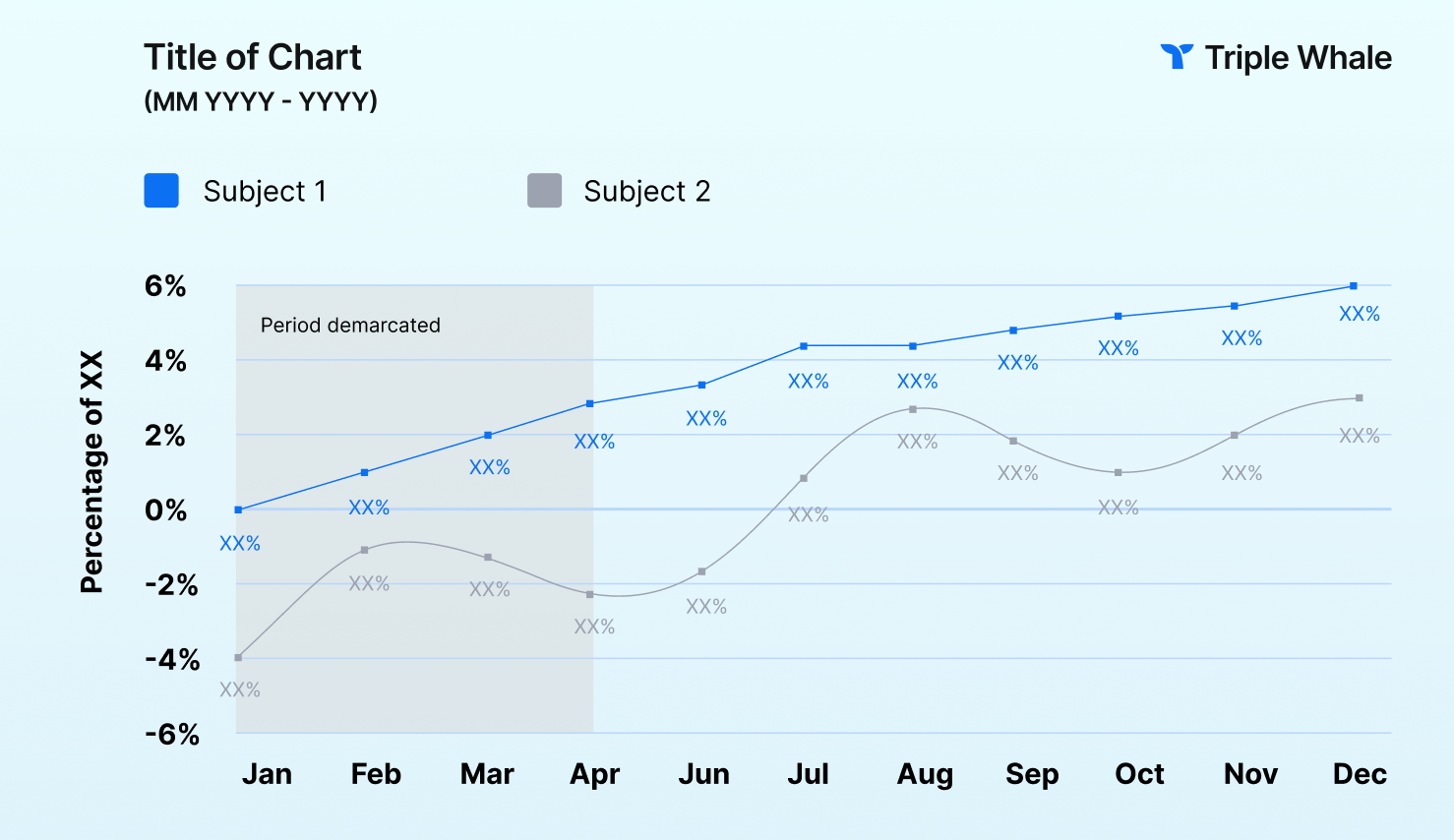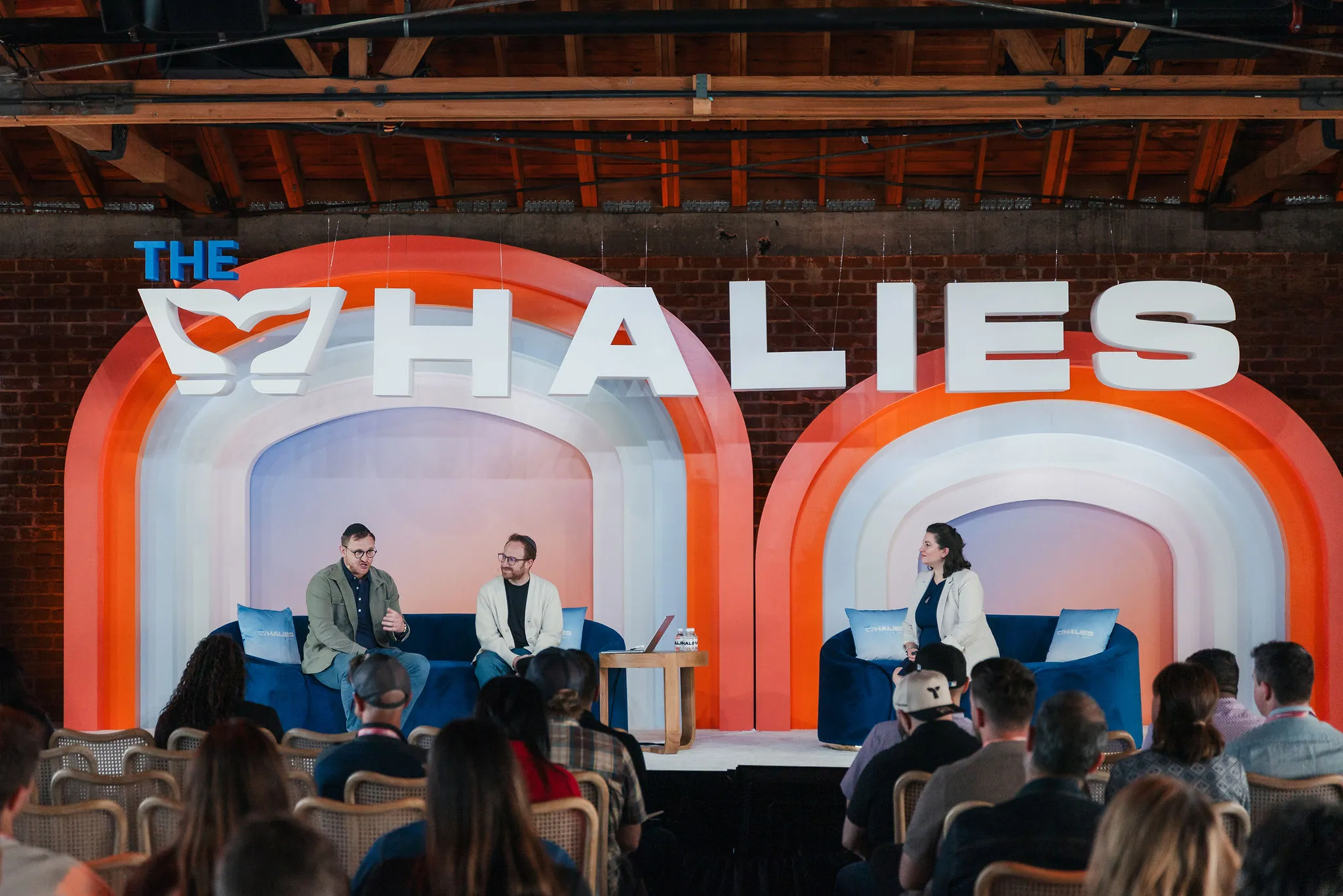
The Whalies 2025… what can we say? It was a vibe, for sure!
From some fantastic presentations to informative panels to getting hands-on demos in the Pods, The Whalies were a high-energy event packed with ideas and inspiration.
This blog will recap some of the highlights for those of you who couldn’t make it out to Los Angeles! They include:
This wasn’t even everything that happened! We had a Sip & Build session where you could build your own AI agent from scratch, but only if you skipped Happy Hour. Just how dedicated are you?
We can’t cover it all, but we’ll break down the coolest parts of The Whalies so you know why you need to grab your ticket to next year’s event!
And if you want to relive the entire event, check out the full session recordings.
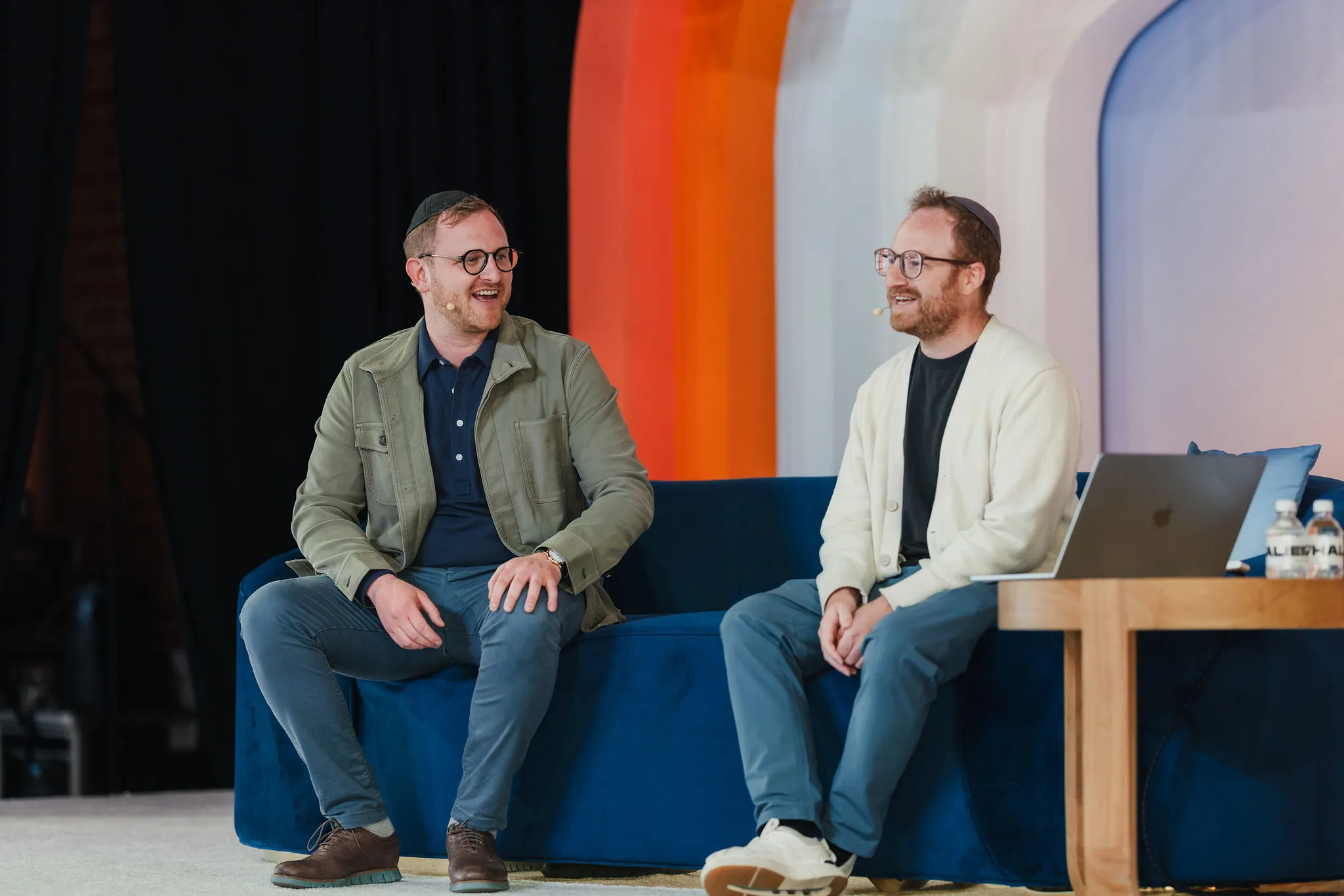
What better way is there to kick off The Whalies than to tell you about all of the very awesome work we’ve been doing?
Jenna kicked it off with a question: “How many of you open multiple dashboards before your first cup of coffee?”
Unsurprisingly, several hands in the audience went up.
We’re living through the single greatest expansion of information humanity has ever seen. In 2015, the total amount of data in the world added up to about 18 zettabytes. By the end of this year, it will cross 175 zettabytes.
That’s a lot of data, and we’re often drowning in it. The volume of data no longer equals value. We might have a lot of it, but we’re still struggling to turn that data into decisions, quickly and confidently.
In 2025, data volume and AI power are slamming together. In theory, there’s a magical, limitless potential where raw signal meets super-human intelligence. However, one piece is still missing, and it’s contextual intelligence.
Many generic AI models can work with copious amounts of data quickly and easily, but the problem is that they’re not trained to understand what the data really means, so you can’t trust its insights any more than you can trust some guy on the street.
But, that’s why we’re here.
The next generation of Triple Whale is an agent-powered intelligence platform trained to understand ecommerce data. The Triple Whale Data platform is the foundation upon which everything else is built, and pulls all of your business metrics into a single source of truth, that’s updated in real time.
On top of that foundation is the Triple Pixel, our proprietary attribution models, forecasting, and the business intelligence tools necessary to analyze your data from every angle.
The star of the show is Moby: our purpose-built AI, trained on billions of commerce events, so it actually knows how to analyze your data. And Moby Agents are the smartest AI agents in the industry, because they spot opportunities to make you more money that no human could find, or flag anomalies before they impact revenue. You can even automate and schedule analyses, which takes your hours of reporting time down to minutes.
Moby Agents are already driving massive impact for both brands and agencies, and many of the sessions at The Whalies dove into how brands use Triple Whale to take their businesses to the next level.
You can be one of those brands. Sign up for a demo to see just what Moby Agents can do!

In our keynote session, Jen Atkin, co-founder and CCO of OUAI took the stage to share her insights on building an authentic brand and community. From humble beginnings to a beauty industry powerhouse, Jen shared her remarkable path from a small-town upbringing to becoming what the New York Times called “the most influential hair stylist in the world”, and a groundbreaking business leader.
In 2016, she launched OUAI, her haircare brand designed to address what she identified as her clients’ key needs: healthier hair and more time. In the keynote, she detailed the many challenges of scaling a beauty business, particularly the delicate balance between growth and maintaining brand integrity. This meant she had to bring in strategic partners to allow OUAI to scale while preserving its identity.
In 2021, Proctor & Gamble acquired OUAI, but despite the acquisition the entire team remained in place with Atkin as the founder and chief creative officer, a testament to the strength of the brand’s identity and Jen’s leadership.
Jen emphasized that success isn’t just about building products, but creating community. Through her digital platform Mane Addicts and her social media presence, she’s fostered spaces where both professionals and consumers can connect, learn, and grow. Her message to aspiring entrepreneurs is to create an authentic connection with your audience and couple it with tireless innovation and strategic growth. This is what can create brands that transcend their original categories to become lasting lifestyle movements.

Measuring marketing performance is harder than ever.
The three core challenges facing marketers today with regards to measurement are:
With a fragmented landscape, marketers need specialized tools for measurement. Some of the tools we use at Triple Whale are:
The problem is that these tools often exist in separate silos, creating conflicting recommendations, blind spots in measurement, and confusion for marketing teams that are trying to process data from multiple systems with different contexts and metrics.
The Unified Measurement model combines the three approaches using AI to bring it all together:
The AI layer that combines the above models comes in the form of Moby AI. It provides automated intelligence across all measurement models, delivering context-aware recommendations that consider strategic, tactical, and causal data.
Key benefits of the unified approach:

Brands will be able to use GeoLift Incrementality to identify test markets and compare performance against matched synthetic control regions, and support is coming for all major ad platforms. This will allow brands to measure the true incremental impact at a geographic level.

This panel featured insights from Kim Larsen, Director of Product Data Science at Shopify, Curtis Matsko, CEO at Portland Leather Goods, and Pauline Tai, Director of Growth at Warmies.
Right off the bat, we are hit with a killer quote from Curtis: “I don’t need more data. Data does nothing unless it helps me make an actionable decision.”
Pauline also noted that “you can have a ton of data, but if you don’t ask the right questions, it doesn’t matter.” And this is what we keep talking about, friends!
To build a data-driven organization, the panel suggested the following tactics for cross-collaboration:
When hiring for a data-focused team, Curtis Matsko specifically noted he looks for three essential qualities:
Curtis emphasized how important it is to be able to talk about your data with ease, especially in networking events like The Whalies!
We also got some insightful perspectives on current data trends courtesy of Kim from Shopify:
There was also advice to step away from the damn computer. Go meet an actual human.
“Breakthroughs always happen when you’re doing the dishes. Breakthroughs will not come when you’re staring at a computer. That comes in real life, with real people.”

AppLovin burst onto the ecommerce advertising scene in late 2024, and has been extremely successful for many brands in a short period of time. With new platforms comes new skepticism, and many brands requested some insight into attribution, which is where the partnership with Triple Whale came in. Using Triple Whale, brands were able to verify the numbers they were seeing were actually real, and then they had the confidence to rapidly increase their spend.
This panel featured Cathy Sun, Head of Ecommerce Strategy & Partnerships at AppLovin as well as representatives from a few brands in AppLovin’s closed beta for ecommerce advertisers: Miranda Akins, Performance Marketing Manager at Cuddle Clones, Scott Kramer, VP of Growth at AS Beauty, and Bryan Cano, VP of Marketing at True Classic.
The panel shared the same sentiment as Cathy outlined: that the numbers were unbelievable. Most notably, Cuddle Clones shared a remarkable scaling story. They decided to start advertising on AppLovin the week before Black Friday, and took their spend from $1,000 per day to $80,000 per day, in only seven short days.
In the discussion, we also learned about a few performance indicators that make AppLovin compelling as a new advertising platform:
Why and how is AppLovin driving such positive numbers? It’s the ad format.
Typical ads on Meta need to grab the customer’s attention within 3 seconds, or they’re gone. Facebook and Instagram ads live inside the feed, and are designed to feel like they’re part of the overall experience. AppLovin’s ads, on the other hand, are presented at the end of a level in a game, and are unskippable. These ads can be up to 60 seconds long, which gives advertisers more time to hook a prospective customer.
Since freemium games have been around for such a long time, people are comfortable with watching ads. Typical ads on the platform are of other games, which simulate the gameplay to get the player to go download the new game. But for ecommerce brands, they can experiment with the format and end cards so that the ads are highly customizable. This opens up a whole new world for ecommerce ads that isn’t through social media, which means AppLovin advertisers are potentially reaching a whole new market of customers.

This panel featured DTC experts discussing how they’ve used data insights to scale their operations and enter new markets. The moderators and speakers were:
Joey Steger offered a refreshing perspective on metrics tracking: “Not just looking at the metrics each week and whether they’re up or down. How are we progressing towards the overall goal?”
He explained how much of an impact using Triple Whale has had on their ability to understand how marketing campaigns worked. He said: “Being able to mix the attribution view for different campaigns that are in different parts of the funnel have been critical to see how effective they are.”
Alexander Ayres highlighted some exciting developments coming for Snapchat:
David Alvarado of Brēz shared their cross-platform ad evolution. They initially started advertising on Snapchat by moving their winning Meta creatives over to the platform. But, they soon realized that they needed a stronger hook on Snapchat to capture the user’s attention within the first three seconds. They also analyzed the unsuccessful creatives to understand why they weren’t working to iterate and improve on them. As a result, performance has improved with lower CPC and more swipes on the ads.

Colin Madden, VP of Sales at Feedonomics was joined by Greg McKallagat, Senior Commerce Manager at Google, for a session about how to activate AI as a competitive edge, with no in-house builds required.
The biggest unlock for AI is to understand that all of the cool things that AI agents are able to do comes down to the quality of data inputs. Earlier in the day, our founder AJ Orbach noted that “data is the fuel that is driving AI agents, driving Moby, and driving AI activations.”
They asked the crowd if anyone received a request to update or change a pixel on their website recently, and if they rolled their eyes when they received it. Most people don’t think updating these are important, but Greg notes that ensuring these pixels and tags are updated as quickly as possible and sending the right data into GA4 and ChatGPT or other platforms, to ensure your insight generators aren’t operating on incomplete data.
The session outlined a three-part data strategy for brands:
Colin noted that if you’re just sending data and not tracking results, you’re not necessarily changing your strategy. The biggest and most successful brands are doing this well; they get conversions and pipe the information back into the ad channel to reinform what is going out.
He gives an example of a large sports retailer that sells a lot of volleyball goods. They discovered that a big keyword that was converting was the word ‘beach’. But none of their advertising was focused on how the volleyballs could be utilized for the beach. So they were able to then feed the key converting search term back into the ad strategy.
Greg emphasized that there should be alignment between platform optimization and business goals. He mentioned how often there is confusion between Google Ads showing one thing and Triple Whale showing another, and the brand will use Triple Whale to make business decisions. But the problem could be that Triple Whale attribution is set up to drive new customer acquisition, but in Google Ads you’re always optimized for ROAS. The solution is to ensure that both systems are optimized for the same thing.
What’s better than a DTC podcast? A live DTC podcast, of course!
Phillip Jackson and Brian Lange, co-founders of Future Commerce, are joined by Bryan Cano, VP of Marketing at True Classic to discuss the challenges and opportunities of modern commerce, as well as what they expect will shape retail in the future. The goal for brands should be to transcend the product to become a cultural force, like Apple or Coca-Cola.
Bryan shared that True Classic’s AI framework categorizes applications into three buckets:
When they consider these categories, they create a framework that the rest of the team and organization can think about. For example, if every morning I upload a spreadsheet to pull a report, maybe this is something I can save time with through the use of AI.
Some practical ways True Classic has used AI include:
Phillip from Future Commerce also shared a philosophical framework around marketing. Most brands focus solely on tactics. Fewer brands develop coherent strategies, and even fewer establish meaningful goals beyond revenue. The rarest brands reach the level of vision that can actually outlast founders. He noted: “if you can change what people buy, you can change what people think, and you can change the future.”
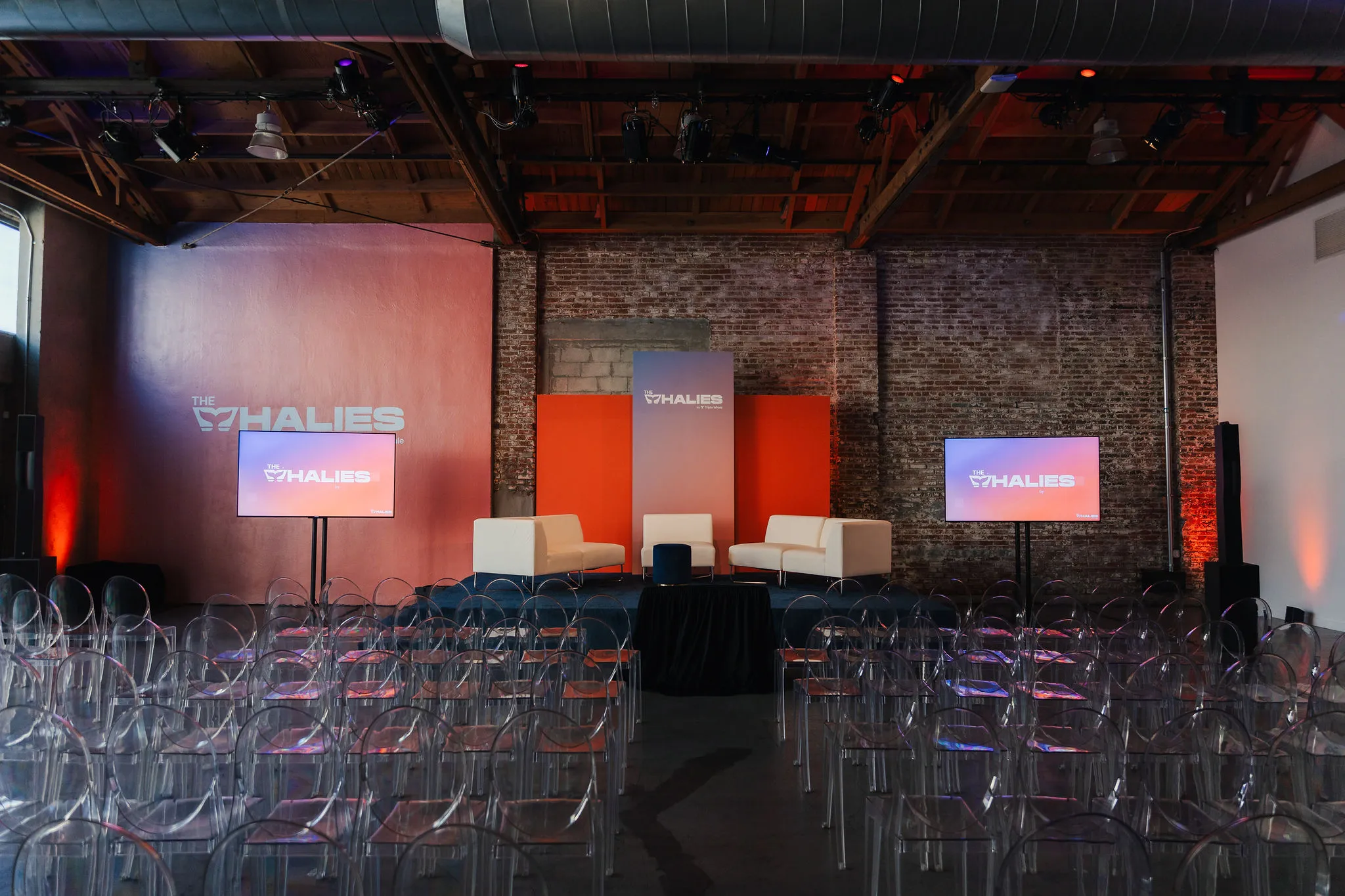
The Whalies delivered so many insights on how to leverage data and AI to build brands with lasting impact. The consistent themes across all sessions came out loud and clear:
As the industry continues to evolve, the tactics shared at The Whalies provide a roadmap for data-driven growth that doesn’t lose sight of the human connections that are most important for driving brands that transcend the product to become iconic.
Ready for the actionable insights that can drive your brand to iconic status? Sign up for a demo of Moby Agents!

The Whalies 2025… what can we say? It was a vibe, for sure!
From some fantastic presentations to informative panels to getting hands-on demos in the Pods, The Whalies were a high-energy event packed with ideas and inspiration.
This blog will recap some of the highlights for those of you who couldn’t make it out to Los Angeles! They include:
This wasn’t even everything that happened! We had a Sip & Build session where you could build your own AI agent from scratch, but only if you skipped Happy Hour. Just how dedicated are you?
We can’t cover it all, but we’ll break down the coolest parts of The Whalies so you know why you need to grab your ticket to next year’s event!
And if you want to relive the entire event, check out the full session recordings.

What better way is there to kick off The Whalies than to tell you about all of the very awesome work we’ve been doing?
Jenna kicked it off with a question: “How many of you open multiple dashboards before your first cup of coffee?”
Unsurprisingly, several hands in the audience went up.
We’re living through the single greatest expansion of information humanity has ever seen. In 2015, the total amount of data in the world added up to about 18 zettabytes. By the end of this year, it will cross 175 zettabytes.
That’s a lot of data, and we’re often drowning in it. The volume of data no longer equals value. We might have a lot of it, but we’re still struggling to turn that data into decisions, quickly and confidently.
In 2025, data volume and AI power are slamming together. In theory, there’s a magical, limitless potential where raw signal meets super-human intelligence. However, one piece is still missing, and it’s contextual intelligence.
Many generic AI models can work with copious amounts of data quickly and easily, but the problem is that they’re not trained to understand what the data really means, so you can’t trust its insights any more than you can trust some guy on the street.
But, that’s why we’re here.
The next generation of Triple Whale is an agent-powered intelligence platform trained to understand ecommerce data. The Triple Whale Data platform is the foundation upon which everything else is built, and pulls all of your business metrics into a single source of truth, that’s updated in real time.
On top of that foundation is the Triple Pixel, our proprietary attribution models, forecasting, and the business intelligence tools necessary to analyze your data from every angle.
The star of the show is Moby: our purpose-built AI, trained on billions of commerce events, so it actually knows how to analyze your data. And Moby Agents are the smartest AI agents in the industry, because they spot opportunities to make you more money that no human could find, or flag anomalies before they impact revenue. You can even automate and schedule analyses, which takes your hours of reporting time down to minutes.
Moby Agents are already driving massive impact for both brands and agencies, and many of the sessions at The Whalies dove into how brands use Triple Whale to take their businesses to the next level.
You can be one of those brands. Sign up for a demo to see just what Moby Agents can do!

In our keynote session, Jen Atkin, co-founder and CCO of OUAI took the stage to share her insights on building an authentic brand and community. From humble beginnings to a beauty industry powerhouse, Jen shared her remarkable path from a small-town upbringing to becoming what the New York Times called “the most influential hair stylist in the world”, and a groundbreaking business leader.
In 2016, she launched OUAI, her haircare brand designed to address what she identified as her clients’ key needs: healthier hair and more time. In the keynote, she detailed the many challenges of scaling a beauty business, particularly the delicate balance between growth and maintaining brand integrity. This meant she had to bring in strategic partners to allow OUAI to scale while preserving its identity.
In 2021, Proctor & Gamble acquired OUAI, but despite the acquisition the entire team remained in place with Atkin as the founder and chief creative officer, a testament to the strength of the brand’s identity and Jen’s leadership.
Jen emphasized that success isn’t just about building products, but creating community. Through her digital platform Mane Addicts and her social media presence, she’s fostered spaces where both professionals and consumers can connect, learn, and grow. Her message to aspiring entrepreneurs is to create an authentic connection with your audience and couple it with tireless innovation and strategic growth. This is what can create brands that transcend their original categories to become lasting lifestyle movements.

Measuring marketing performance is harder than ever.
The three core challenges facing marketers today with regards to measurement are:
With a fragmented landscape, marketers need specialized tools for measurement. Some of the tools we use at Triple Whale are:
The problem is that these tools often exist in separate silos, creating conflicting recommendations, blind spots in measurement, and confusion for marketing teams that are trying to process data from multiple systems with different contexts and metrics.
The Unified Measurement model combines the three approaches using AI to bring it all together:
The AI layer that combines the above models comes in the form of Moby AI. It provides automated intelligence across all measurement models, delivering context-aware recommendations that consider strategic, tactical, and causal data.
Key benefits of the unified approach:

Brands will be able to use GeoLift Incrementality to identify test markets and compare performance against matched synthetic control regions, and support is coming for all major ad platforms. This will allow brands to measure the true incremental impact at a geographic level.

This panel featured insights from Kim Larsen, Director of Product Data Science at Shopify, Curtis Matsko, CEO at Portland Leather Goods, and Pauline Tai, Director of Growth at Warmies.
Right off the bat, we are hit with a killer quote from Curtis: “I don’t need more data. Data does nothing unless it helps me make an actionable decision.”
Pauline also noted that “you can have a ton of data, but if you don’t ask the right questions, it doesn’t matter.” And this is what we keep talking about, friends!
To build a data-driven organization, the panel suggested the following tactics for cross-collaboration:
When hiring for a data-focused team, Curtis Matsko specifically noted he looks for three essential qualities:
Curtis emphasized how important it is to be able to talk about your data with ease, especially in networking events like The Whalies!
We also got some insightful perspectives on current data trends courtesy of Kim from Shopify:
There was also advice to step away from the damn computer. Go meet an actual human.
“Breakthroughs always happen when you’re doing the dishes. Breakthroughs will not come when you’re staring at a computer. That comes in real life, with real people.”

AppLovin burst onto the ecommerce advertising scene in late 2024, and has been extremely successful for many brands in a short period of time. With new platforms comes new skepticism, and many brands requested some insight into attribution, which is where the partnership with Triple Whale came in. Using Triple Whale, brands were able to verify the numbers they were seeing were actually real, and then they had the confidence to rapidly increase their spend.
This panel featured Cathy Sun, Head of Ecommerce Strategy & Partnerships at AppLovin as well as representatives from a few brands in AppLovin’s closed beta for ecommerce advertisers: Miranda Akins, Performance Marketing Manager at Cuddle Clones, Scott Kramer, VP of Growth at AS Beauty, and Bryan Cano, VP of Marketing at True Classic.
The panel shared the same sentiment as Cathy outlined: that the numbers were unbelievable. Most notably, Cuddle Clones shared a remarkable scaling story. They decided to start advertising on AppLovin the week before Black Friday, and took their spend from $1,000 per day to $80,000 per day, in only seven short days.
In the discussion, we also learned about a few performance indicators that make AppLovin compelling as a new advertising platform:
Why and how is AppLovin driving such positive numbers? It’s the ad format.
Typical ads on Meta need to grab the customer’s attention within 3 seconds, or they’re gone. Facebook and Instagram ads live inside the feed, and are designed to feel like they’re part of the overall experience. AppLovin’s ads, on the other hand, are presented at the end of a level in a game, and are unskippable. These ads can be up to 60 seconds long, which gives advertisers more time to hook a prospective customer.
Since freemium games have been around for such a long time, people are comfortable with watching ads. Typical ads on the platform are of other games, which simulate the gameplay to get the player to go download the new game. But for ecommerce brands, they can experiment with the format and end cards so that the ads are highly customizable. This opens up a whole new world for ecommerce ads that isn’t through social media, which means AppLovin advertisers are potentially reaching a whole new market of customers.

This panel featured DTC experts discussing how they’ve used data insights to scale their operations and enter new markets. The moderators and speakers were:
Joey Steger offered a refreshing perspective on metrics tracking: “Not just looking at the metrics each week and whether they’re up or down. How are we progressing towards the overall goal?”
He explained how much of an impact using Triple Whale has had on their ability to understand how marketing campaigns worked. He said: “Being able to mix the attribution view for different campaigns that are in different parts of the funnel have been critical to see how effective they are.”
Alexander Ayres highlighted some exciting developments coming for Snapchat:
David Alvarado of Brēz shared their cross-platform ad evolution. They initially started advertising on Snapchat by moving their winning Meta creatives over to the platform. But, they soon realized that they needed a stronger hook on Snapchat to capture the user’s attention within the first three seconds. They also analyzed the unsuccessful creatives to understand why they weren’t working to iterate and improve on them. As a result, performance has improved with lower CPC and more swipes on the ads.

Colin Madden, VP of Sales at Feedonomics was joined by Greg McKallagat, Senior Commerce Manager at Google, for a session about how to activate AI as a competitive edge, with no in-house builds required.
The biggest unlock for AI is to understand that all of the cool things that AI agents are able to do comes down to the quality of data inputs. Earlier in the day, our founder AJ Orbach noted that “data is the fuel that is driving AI agents, driving Moby, and driving AI activations.”
They asked the crowd if anyone received a request to update or change a pixel on their website recently, and if they rolled their eyes when they received it. Most people don’t think updating these are important, but Greg notes that ensuring these pixels and tags are updated as quickly as possible and sending the right data into GA4 and ChatGPT or other platforms, to ensure your insight generators aren’t operating on incomplete data.
The session outlined a three-part data strategy for brands:
Colin noted that if you’re just sending data and not tracking results, you’re not necessarily changing your strategy. The biggest and most successful brands are doing this well; they get conversions and pipe the information back into the ad channel to reinform what is going out.
He gives an example of a large sports retailer that sells a lot of volleyball goods. They discovered that a big keyword that was converting was the word ‘beach’. But none of their advertising was focused on how the volleyballs could be utilized for the beach. So they were able to then feed the key converting search term back into the ad strategy.
Greg emphasized that there should be alignment between platform optimization and business goals. He mentioned how often there is confusion between Google Ads showing one thing and Triple Whale showing another, and the brand will use Triple Whale to make business decisions. But the problem could be that Triple Whale attribution is set up to drive new customer acquisition, but in Google Ads you’re always optimized for ROAS. The solution is to ensure that both systems are optimized for the same thing.
What’s better than a DTC podcast? A live DTC podcast, of course!
Phillip Jackson and Brian Lange, co-founders of Future Commerce, are joined by Bryan Cano, VP of Marketing at True Classic to discuss the challenges and opportunities of modern commerce, as well as what they expect will shape retail in the future. The goal for brands should be to transcend the product to become a cultural force, like Apple or Coca-Cola.
Bryan shared that True Classic’s AI framework categorizes applications into three buckets:
When they consider these categories, they create a framework that the rest of the team and organization can think about. For example, if every morning I upload a spreadsheet to pull a report, maybe this is something I can save time with through the use of AI.
Some practical ways True Classic has used AI include:
Phillip from Future Commerce also shared a philosophical framework around marketing. Most brands focus solely on tactics. Fewer brands develop coherent strategies, and even fewer establish meaningful goals beyond revenue. The rarest brands reach the level of vision that can actually outlast founders. He noted: “if you can change what people buy, you can change what people think, and you can change the future.”

The Whalies delivered so many insights on how to leverage data and AI to build brands with lasting impact. The consistent themes across all sessions came out loud and clear:
As the industry continues to evolve, the tactics shared at The Whalies provide a roadmap for data-driven growth that doesn’t lose sight of the human connections that are most important for driving brands that transcend the product to become iconic.
Ready for the actionable insights that can drive your brand to iconic status? Sign up for a demo of Moby Agents!
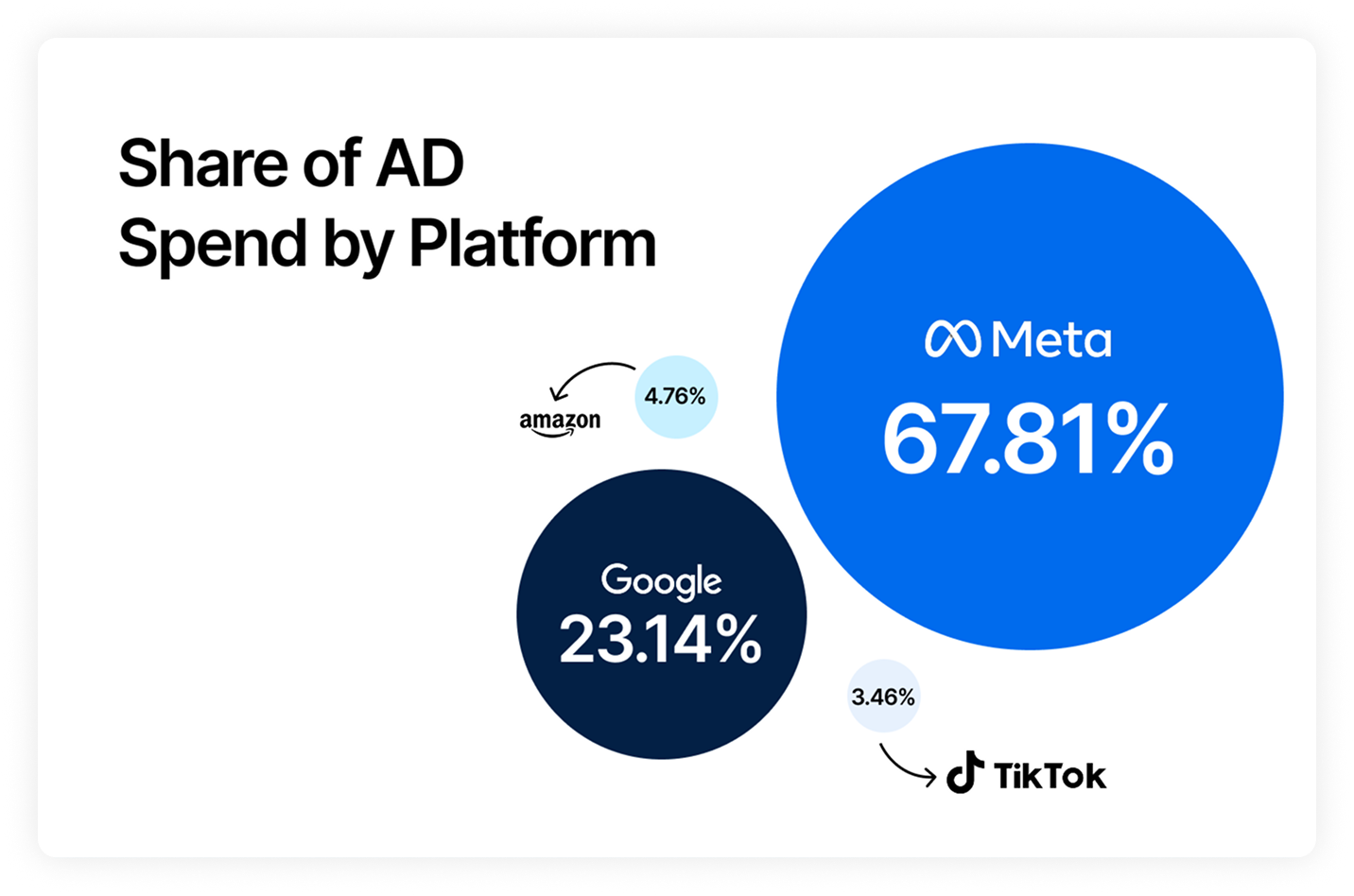
Body Copy: The following benchmarks compare advertising metrics from April 1-17 to the previous period. Considering President Trump first unveiled his tariffs on April 2, the timing corresponds with potential changes in advertising behavior among ecommerce brands (though it isn’t necessarily correlated).
